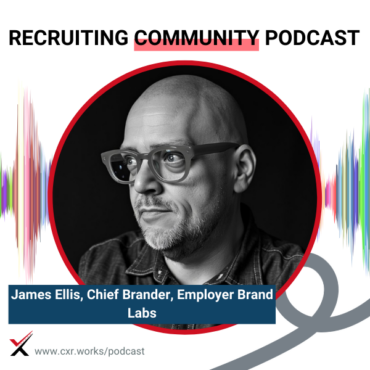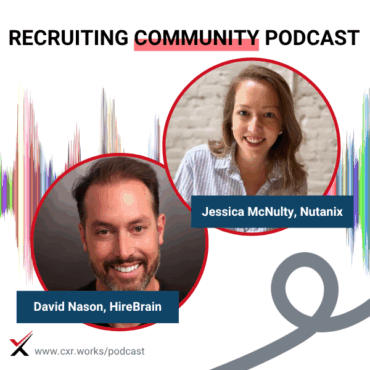
Hiring Enablement Solutions
What happens when hiring starts with the manager, not the job req? Nutanix and HireBrain share how role design is reshaping TA—and boosting strategic impact.
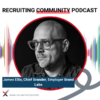 play_arrow
play_arrow
Talent Chooses You: Reframing the Role of TA in Driving Growth Cami Grace
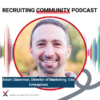 play_arrow
play_arrow
Inside the Cox Career Site Redesign: Data, AI & Candidate Experience Cami Grace
 play_arrow
play_arrow
Vietnam TA/HR Delegation Recap Cami Grace
 play_arrow
play_arrow
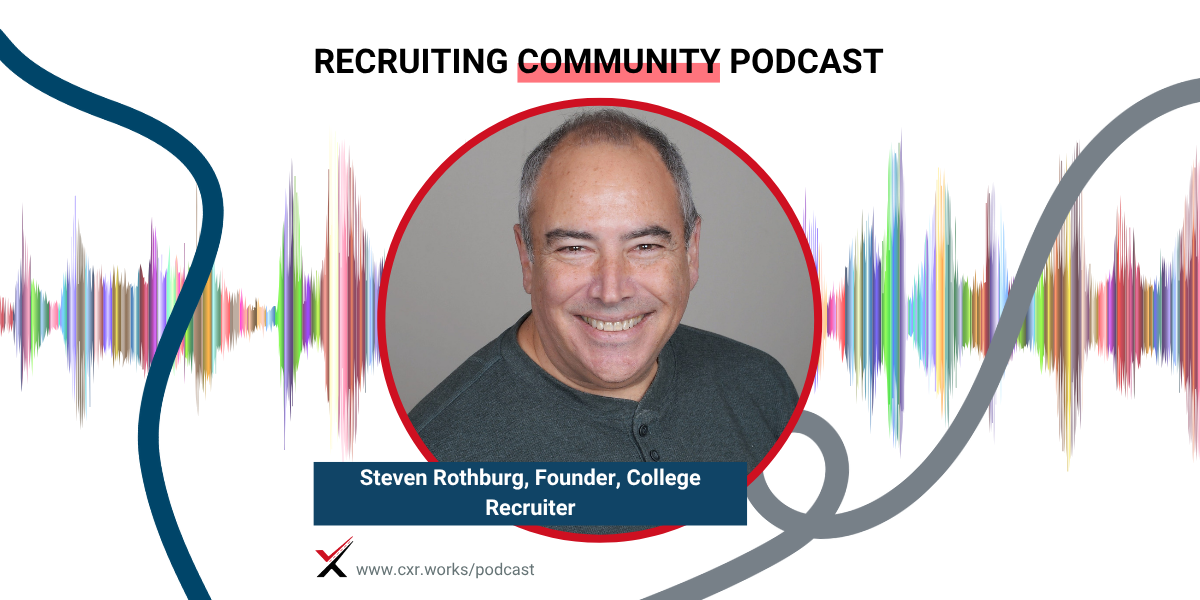
Episode Overview:
In this lively episode of the CXR Podcast, hosts Gerry and Chris engage with Steven Rothberg, founder of College Recruiter, to discuss the intersection of technology and recruitment. The conversation delves into the challenges and advancements in using AI and automated systems for talent acquisition, emphasizing the need for transparency and accountability in these processes.
Key Topics Covered:
Closing Notes:
Today’s episode provided an in-depth look at the critical issues surrounding technology in recruitment. Steven Rothberg offered expert analysis on how AI and automation are reshaping talent acquisition, stressing the importance of ethical practices and compliance with legal standards. As AI becomes increasingly integrated into recruitment processes, organizations must ensure these tools are used responsibly to avoid bias and uphold fairness in hiring practices.
Title:
HR Tech Disrupted
Featured Guests:
Steven Rothberg, Founder, College Recruiter
Hosts:
Chris Hoyt, President, CareerXroads
Gerry Crispin, Principal & Co-founder, CareerXroads
Episode Overview:
Steven Rothberg returns to the podcast for a candid discussion on AI risks in recruiting, including the legal and ethical challenges tied to automation, candidate ranking, and vendor accountability. The conversation spans platform responsibility, the implications of the Mobley v. Workday lawsuit, and what talent leaders should do now to prepare for increased scrutiny and regulation in AI-driven hiring processes.
Key Topics:
AI use in job boards, sourcing platforms, and ranking systems
Risks of automated candidate rejection and bias
The Mobley v. Workday lawsuit and its industry implications
Regulatory accountability for vendors and employers
Need for transparency in algorithmic decision-making
Role of third-party validation and audit trails
Common misconceptions around vendor vs. employer responsibility
Notable Quotes:
“If your system auto-ranks 100 applicants and only the top 20 are reviewed, you better know how they got ranked.” —Steven Rothberg
“You can’t distance yourself by saying, ‘That’s the vendor’s algorithm.’ It’s your process.” —Steven Rothberg
“Both vendors and employers are accountable.” —Steven Rothberg
“Ask vendors for transparency. Ask how ranking works. Ask for audit trails.” —Steven Rothberg
“The lawsuit is a class action. If it’s not just one guy—but thousands—employers have a serious problem.” —Steven Rothberg
Takeaways:
The rise of AI in recruiting has ushered in real legal and ethical risk—especially when candidate ranking systems lack transparency. Steven Rothberg underscores the shared responsibility between employers and vendors to ensure fairness, explainability, and compliance in automated hiring. Leaders must proactively ask questions, demand auditability, and treat automation with the same rigor applied to human decision-making.
Want more conversations like this?
Subscribe to the CXR podcast and explore how top talent leaders are shaping the future of recruiting. Learn more about the CareerXroads community at cxr.works.
Chris Hoyt: I’ve never met a person harder on technology than Jerry. I mean, I’ll go through some stuff because I get bored with it, but Jerry—this is why you’re always current. It’s not because you’re chasing cutting-edge. It’s because the last one exploded and you need the next.
Gerry Crispin: Unfortunately, that’s true. I have no idea why. It just is what it is.
Steven Rothberg: Every time I see Jerry walking into a Best Buy, I just buy stock.
Chris Hoyt: You should—100% should. I don’t know how you do it, Jerry. It’s fascinating. All the tech.
Okay, well, we do have a fun tech question today. Are we ready?
Steven Rothberg: Oh yeah!
Chris Hoyt: That’s how you bring in a Tuesday morning right there.
Announcer: CXR Channel—our premier podcast for talent acquisition and talent management. Listen in as the CXR community discusses a wide range of topics focused on attracting, engaging, and retaining top talent. We’re glad you’re here.
Chris Hoyt: Oh my goodness, I’m still laughing. Good morning! How are you, Jerry?
Gerry Crispin: I’m doing better now that I can see myself speaking in real time.
Chris Hoyt: It works! Whatever you unplugged, it works. Glad you did it.
Welcome everybody to the Recruiting Community Podcast. Weekly insights delivered through conversation. I’m your host, Marky, and with me is… Mark.
Gerry Crispin: You gotta give me a heads up on these so I can prepare a better response!
Chris Hoyt: That would take all the fun out of it. Plus, I’m excited—we’re bringing in the Funky Bunch today to catch up with Steven Rothberg, founder of College Recruiter. We’re talking about regulatory updates, maybe a lawsuit or two, and some risks organizations are taking with AI in recruiting.
Quick housekeeping—We’re streaming on YouTube, Facebook, LinkedIn, and Twitch. If you’re watching live on LinkedIn, say hello in the chat. Ask a question, share an opinion—we’ll include you.
A quick announcement—our latest report just launched!
Gerry Crispin: The conflict of interest issue has been on my mind for years. This is the first time I’ve seen real movement. I’ve been very pleased with the responses throughout the effort.
Chris Hoyt: Yep, it’s live now at cxr.works/coi. We partnered with Alex Murphy from JobSync as co-facilitator and sponsor. The report is about 30 pages—based on input from over 30 TA leaders and hundreds of CXR members.
There’s also a downloadable rider—available under a Creative Commons license—focused on transparency when working with vendors. You’ll find it in the report.
Alright, let’s bring him in. Mr. Funky Bunch himself—Steven Rothberg. How are you?
Steven Rothberg: I’m good. I just wanna know—is it Marky or Mark? Or are we doing Milli Vanilli?
Chris Hoyt: Ooh, that’s a good one. Jerry, if I introduce you as Vanilli, will you say, “Girl, you know it’s true”?
Gerry Crispin: I’ll do something close, as long as I know it’s coming.
Chris Hoyt: Alright, Steven, for those who don’t know you—who is Steven Rothberg, and why should we listen to you today?
Steven Rothberg: Sure. I’m the founder of College Recruiter, a global job search site for students and recent grads. Our mission: every student and recent grad deserves a great career.
At any time, we have several million early-career job postings—part-time, seasonal, internships, and entry-level. Over a million candidates use our platform monthly—measured conservatively, based on the number we send to employers.
We launched online in 1996. Before that, we did employment magazines and campus maps. By 2000, it was clear online was the future. We shut down the print side—even though that’s where the profits were—and went all in on digital. I think we’re on version seven or eight of our site now.
Gerry Crispin: It’s worth noting that about 30 years ago, I reviewed Steven’s platform. I could always count on a call from him within 15 minutes of publishing—offering “helpful feedback” on how to improve his rating.
Steven Rothberg: If you look up the word “tenacious” in the dictionary, you might find my picture there.
Chris Hoyt: Under talent!
Steven Rothberg: Oh no—more like under the Peter Principle. We all rise to our level of incompetency!
Chris Hoyt: So, safe to say, you’ve been around a while and seen some stuff.
Steven Rothberg: Yep.
Chris Hoyt: Let’s dive in. AI’s in every conversation lately. From your perspective, how is AI—or automation—affecting platforms like College Recruiter? Are there challenges unique to your segment of the market?
Steven Rothberg: Honestly, the issues are fairly universal. Any platform with meaningful scale is using automation or AI in some way—whether that’s ranking, matching, or processing data.
Small mom-and-pop job boards using WordPress probably aren’t. But any platform with tens of thousands of users—certainly millions—definitely is.
There’s huge opportunity, but also serious risk. I think 2024 has been the year TA professionals woke up to that risk.
Chris Hoyt: A year ago, it was all chatbots and basic screening. It’s evolved a lot. But you raise an important point—the services we use are already using AI behind the scenes.
Steven Rothberg: Exactly. The matching and ranking systems—how candidates are sorted and prioritized—that’s where the risk lies. If your system is auto-ranking 100 applicants and only the top 20 are ever reviewed, you better know how they got ranked.
You can’t distance yourself by saying, “That’s the vendor’s algorithm.” It’s your process. Legally, ethically—you own it.
Gerry Crispin: But there are some gray areas there, right?
Steven Rothberg: It’s murky. If I were a TA leader, I’d be concerned. It’s easy for a lawyer to say, “Just don’t use black-box AI.” But the problem is—most of it is black-box.
Gerry Crispin: I love what you’re saying though—that employers need to be accountable. That starts with asking the right questions.
Steven Rothberg: Yep. There’s a lawsuit worth noting: Mobley v. Workday. Mobley, a Black male, applied to over 100 jobs at employers using Workday. He was rejected from all—sometimes within minutes, in the middle of the night.
It’s unlikely a recruiter was working at 1:42 a.m. The implication is an automated system rejected him.
Chris Hoyt: And this kind of automation has been happening forever.
Steven Rothberg: Exactly. And not all automation is bad. If someone says they’re not eligible to work in the U.S. or don’t have a driver’s license for a truck-driving job—rejecting them immediately makes sense.
But with AI, many employers don’t even know why a candidate was rejected. If the AI ranks them too low and no one ever sees them—that’s still effectively a rejection.
Gerry Crispin: And the Mobley case is groundbreaking because it puts accountability on the vendor—Workday—not just the employer.
Steven Rothberg: Right. The EEOC is supporting Mobley. And when the federal government gets involved, with resources and weight, things change.
Also, the lawsuit is a class action. If it’s not just one guy—but thousands of candidates—employers have a serious problem.
Chris Hoyt: So this could extend to staffing firms, job boards, or platforms like LinkedIn that rank candidates.
Steven Rothberg: Absolutely. If you search for candidates and only contact the first few the platform serves up—without knowing how that list was sorted—you may be complicit in discrimination.
Chris Hoyt: Are job boards even thinking about this?
Steven Rothberg: No. I talked to 20 leaders at a TA tech conference. None were worried. Many think they’re off the hook because they don’t “make hiring decisions.” But employers think the opposite—it’s the vendor’s tech.
The truth is: both are accountable.
Chris Hoyt: So what should employers do?
Steven Rothberg: Ask vendors for transparency. Ask how ranking works. Ask for audit trails. Just like with staffing firms—document why one candidate was chosen over another.
Gerry Crispin: And vendors need third-party validation. We need independent services that audit AI systems for compliance and fairness.
Chris Hoyt: We live in interesting times. And that’s exhausting.
Steven Rothberg: It was easier when we lived in caves and hunted saber-tooth tigers.
Chris Hoyt: Alright, before we let you go—we ask everyone this: If you wrote a book about this conversation, what would the title be?
Steven Rothberg: Milli Vanilli in Recruiting: Girl, You Know It’s True.
Chris Hoyt: And who gets the first signed copy?
Steven Rothberg: Jerry. He sent me a book once after I sent him a check. Transactions 101!
Chris Hoyt: That’s how commerce works, Steven! Also, I remember Mark’s garage full of books, while Jerry was getting wine deliveries.
Steven Rothberg: That explains everything.
Chris Hoyt: Alright, Steven, always a pleasure. You’ve got a couple podcasts worth plugging—what are they?
Steven Rothberg: Sure. High Volume Hiring Podcast and Inside Job Boards and Recruitment Marketplaces. Both are on LinkedIn.
Chris Hoyt: Check them out! And for listeners—no episode next week. We’ll be at Spectrum’s HQ with 40–50 leaders for a meeting on employer branding and recruitment marketing.
Thanks for joining us—we’ll see you next time!
Announcer: Thanks for listening to the CXR Channel. Subscribe on your favorite podcast platform and leave us a review. Learn more at cxr.works and follow us on social @careerxroads. See you next time!
Tagged as: Technology, Podcast, employee experience, HR Tech.
Chris Hoyt is the President of CareerXroads, a global peer community for talent acquisition leaders driving strategic change. With decades of experience leading recruiting innovation at Fortune 500 companies, Chris now advises enterprise TA teams on tech, process, and leadership. He’s a frequent speaker at conferences like SHRM, HR Tech, LinkedIn, and UNLEASH, and he’s known for pushing conversations beyond buzzwords to get to what really works in hiring. Through CXR, he connects top TA professionals to solve real problems, challenge norms, and shape the future of recruiting.

What happens when hiring starts with the manager, not the job req? Nutanix and HireBrain share how role design is reshaping TA—and boosting strategic impact.
